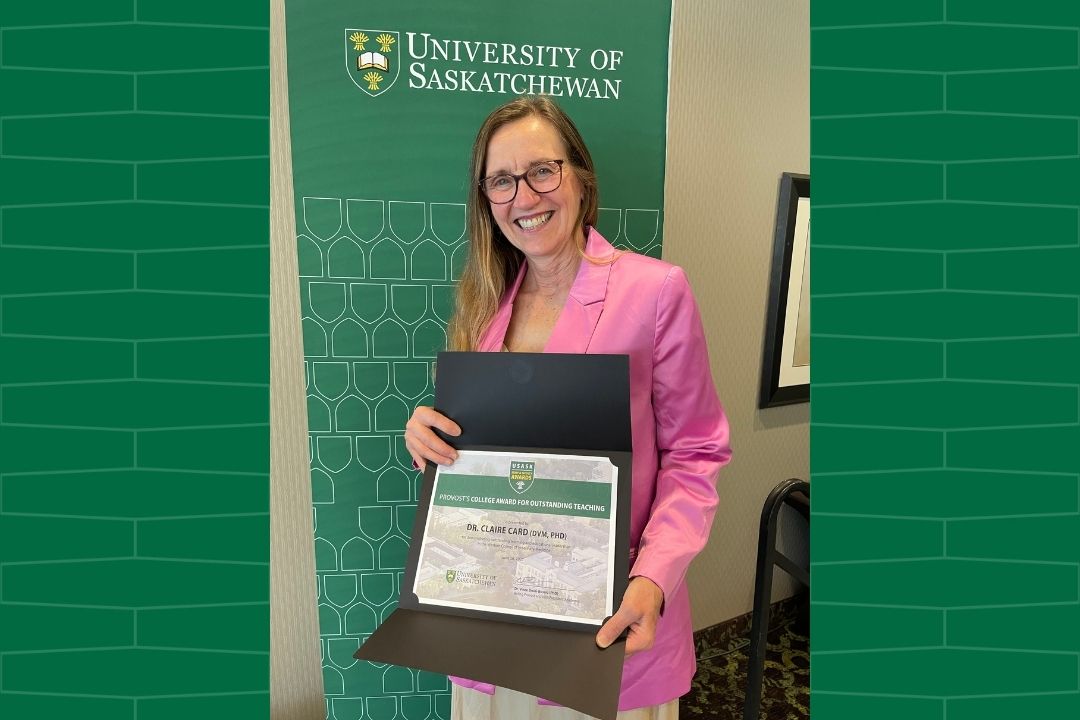
WCVM professor earns university’s top educator award through commitment to ‘co-learning’
For over three decades, Dr. Claire Card’s approach to educating future veterinarians at the Western College of Veterinary Medicine (WCVM) has revolved around the importance of using every experience — whether a success or failure — as an opportunity for growth.
By Tyler Schroeder“I often joke with students about how good experience comes from poor judgment,” says Card (DVM, PhD), a professor, researcher and equine theriogenologist at the WCVM. “I have a lot of experience which means I’ve made a few mistakes over the years, and I humbly admit that to the students.”
Card is the WCVM recipient of the University of Saskatchewan (USask) Provost’s College Award for Outstanding Teaching, presented as part of the university’s 2025 Staff and Faculty Awards. The recognition spotlights outstanding faculty members at each USask college who exemplify excellence in teaching, mentorship and leadership. Card received the award at the annual awards ceremony, which was held in June 2025.
“I feel very humbled and honoured to be selected for this award,” Card says. “Over my career, I’ve taught in lab, classroom and hospital settings, so there have been many different areas of focus, and I’m deeply grateful to those who nominated me.”
Originally from Adams, N.Y., Card earned her veterinary degree from New York State College in 1986, followed by a PhD in physiology from Cornell University in 1989. She joined the WCVM faculty as a theriogenologist in 1991, and over the past three decades, she has built a reputation as a trailblazer in equine and production animal reproduction research and education.
After working as a general practitioner in the WCVM Equine Field Service for 15 years, Card established the WCVM Veterinary Medical Centre’s Equine Reproduction Service, which has become a prominent referral hub for horse infertility clients. Her clinical expertise has influenced innovative research projects and educational outreach on equine pregnancy, fetal thyroid function and reproductive techniques.
The main driver for Card’s projects is finding opportunities to enhance the well-being of horses and the clinical service options available for equine clients.
“We’re always striving for our clinical practices to be on the cutting edge. When we provide 100 per cent of our efforts to clients, we’re thinking about what 110 per cent looks like and we reach for that,” says Card. “I love our clients, and I hope they feel valued and appreciated when they see us doing our best.”
Beyond the classroom and the clinic, Card uses a One Health approach to actively address the broader social and economic challenges facing communities globally. In 2006, Card and her WCVM students travelled to Uganda and developed links with students from Makerere University, working to address issues related to livestock and resources with training and support systems. Card’s team helped train women to become “para-vets” — community-based veterinary workers who could provide essential services such as vaccinations and animal health management.
She continues to build on this work as the project lead and animal health lead of the One Health Community Partnerships (OHCP) project — a five-year global initiative with USask faculty and students in community health that aims to empower poor, marginalized farmers in rural Africa, with an emphasis on targeting issues and barriers for women and girls.
As a mentor and educator across many unique settings and environments, Card’s philosophy on teaching is rooted in her belief of being a “co-learner” alongside her students. She believes in the value of lifelong learning, and she encourages students to embrace the idea that education is a collaborative process where both teacher and learner grow together.
“I try to model the fact that I don’t know everything because it’s truly amazing how we all learn from each other when we keep an open mind,” says Card, who also received the J.J. Murison Distinguished Veterinarian Award in 2024. This annual award is the Saskatchewan Veterinary Medical Association’s highest level of recognition for one of its members.
Card’s wealth of knowledge and experience in the field has provided insight into the social responsibilities of veterinary medicine, which are often overlooked but central to the profession. Her lessons include discussions and engagements around soft-skill building on topics such as grief management and client communication — navigating challenges with empathy and compassion.
“Veterinary medicine is a profession that is deeply people-focused,” says Card. “It’s not just about diagnosing and treating animals. We also need to think about how we engage with people — our clients, our colleagues and the communities we serve.”
As she continues to inspire future generations of veterinarians, Card remains committed to the idea that teaching is not just about imparting knowledge — it is about shaping compassionate, thoughtful and proactive individuals who are prepared to make a positive difference.
“I love teaching, and I love to mentor students. I really try to deliver a complete package of the profession so that our students can grow to be well-rounded and prepared to be their best selves,” says Card.